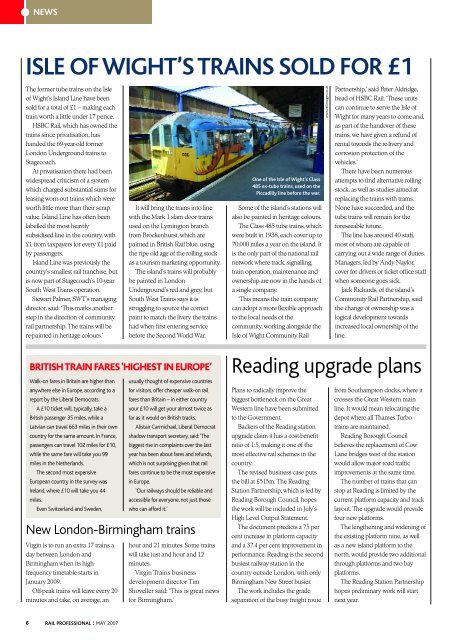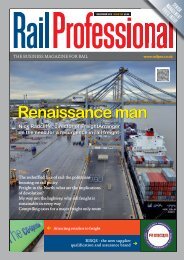move over freightliner, we want to get into ... - Rail Professional
move over freightliner, we want to get into ... - Rail Professional
move over freightliner, we want to get into ... - Rail Professional
You also want an ePaper? Increase the reach of your titles
YUMPU automatically turns print PDFs into web optimized ePapers that Google loves.
NEWS<br />
ISLE OF WIGHT’S TRAINS SOLD FOR £1<br />
The former tube trains on the Isle<br />
of Wight’s Island Line have been<br />
sold for a <strong>to</strong>tal of £1 – making each<br />
train worth a little under 17 pence.<br />
HSBC <strong>Rail</strong>, which has owned the<br />
trains since privatisation, has<br />
handed the 69-year-old former<br />
London Underground trains <strong>to</strong><br />
Stagecoach.<br />
At privatisation there had been<br />
widespread criticism of a system<br />
which charged substantial sums for<br />
leasing worn-out trains which <strong>we</strong>re<br />
worth little more than their scrap<br />
value. Island Line has often been<br />
labelled the most heavily<br />
subsidised line in the country, with<br />
£1 from taxpayers for every £1 paid<br />
by passengers.<br />
Island Line was previously the<br />
country’s smallest rail franchise, but<br />
is now part of Stagecoach’s 10-year<br />
South West Trains operation.<br />
Stewart Palmer, SWT’s managing<br />
direc<strong>to</strong>r, said: ‘This marks another<br />
step in the direction of community<br />
rail partnership. The trains will be<br />
re-painted in heritage colours.’<br />
It will bring the trains in<strong>to</strong> line<br />
with the Mark 1 slam door trains<br />
used on the Lyming<strong>to</strong>n branch<br />
from Brockenhurst, which are<br />
painted in British <strong>Rail</strong> blue, using<br />
the ripe old age of the rolling s<strong>to</strong>ck<br />
as a <strong>to</strong>urism marketing opportunity.<br />
The island’s trains will probably<br />
be painted in London<br />
Underground’s red and grey, but<br />
South West Trains says it is<br />
struggling <strong>to</strong> source the correct<br />
paint <strong>to</strong> match the livery the trains<br />
had when first entering service<br />
before the Second World War.<br />
One of the Isle of Wight’s Class<br />
485 ex-tube trains, used on the<br />
Piccadilly line before the war.<br />
Some of the island’s stations will<br />
also be painted in heritage colours.<br />
The Class 485 tube trains, which<br />
<strong>we</strong>re built in 1938, each c<strong>over</strong> up <strong>to</strong><br />
70,000 miles a year on the island. It<br />
is the only part of the national rail<br />
network where track, signalling,<br />
train operation, maintenance and<br />
ownership are now in the hands of<br />
a single company.<br />
‘This means the train company<br />
can adopt a more flexible approach<br />
<strong>to</strong> the local needs of the<br />
community, working alongside the<br />
Isle of Wight Community <strong>Rail</strong><br />
www.railimages.co.uk<br />
Partnership,’ said Peter Aldridge,<br />
head of HSBC <strong>Rail</strong>. ‘These units<br />
can continue <strong>to</strong> serve the Isle of<br />
Wight for many years <strong>to</strong> come and,<br />
as part of the hand<strong>over</strong> of these<br />
trains, <strong>we</strong> have given a refund of<br />
rental <strong>to</strong>wards the re-livery and<br />
corrosion protection of the<br />
vehicles.’<br />
There have been numerous<br />
attempts <strong>to</strong> find alternative rolling<br />
s<strong>to</strong>ck, as <strong>we</strong>ll as studies aimed at<br />
replacing the trains with trams.<br />
None have succeeded, and the<br />
tube trains will remain for the<br />
foreseeable future.<br />
The line has around 40 staff,<br />
most of whom are capable of<br />
carrying out a wide range of duties.<br />
Managers, led by Andy Naylor,<br />
c<strong>over</strong> for drivers or ticket office staff<br />
when someone goes sick.<br />
Jack Richards, of the island’s<br />
Community <strong>Rail</strong> Partnership, said<br />
the change of ownership was a<br />
logical development <strong>to</strong>wards<br />
increased local ownership of the<br />
line.<br />
BRITISH TRAIN FARES ‘HIGHEST IN EUROPE’<br />
Walk-on fares in Britain are higher than<br />
anywhere else in Europe, according <strong>to</strong> a<br />
report by the Liberal Democrats.<br />
A £10 ticket will, typically, take a<br />
British passenger 35 miles, while a<br />
Latvian can travel 663 miles in their own<br />
country for the same amount. In France,<br />
passengers can travel 102 miles for £10,<br />
while the same fare will take you 99<br />
miles in the Netherlands.<br />
The second most expensive<br />
European country in the survey was<br />
Ireland, where £10 will take you 44<br />
miles.<br />
Even Switzerland and S<strong>we</strong>den,<br />
Virgin is <strong>to</strong> run an extra 17 trains a<br />
day bet<strong>we</strong>en London and<br />
Birmingham when its highfrequency<br />
timetable starts in<br />
January 2009.<br />
Off-peak trains will leave every 20<br />
minutes and take, on average, an<br />
usually thought of expensive countries<br />
for visi<strong>to</strong>rs, offer cheaper walk-on rail<br />
fares than Britain – in either country<br />
your £10 will <strong>get</strong> your almost twice as<br />
far as it would on British tracks.<br />
Alistair Carmichael, Liberal Democrat<br />
shadow transport secretary, said:‘The<br />
biggest rise in complaints <strong>over</strong> the last<br />
year has been about fares and refunds,<br />
which is not surprising given that rail<br />
fares continue <strong>to</strong> be the most expensive<br />
in Europe.<br />
‘Our railways should be reliable and<br />
accessible for everyone, not just those<br />
who can afford it.’<br />
New London-Birmingham trains<br />
hour and 21 minutes. Some trains<br />
will take just and hour and 12<br />
minutes.<br />
Virgin Trains business<br />
development direc<strong>to</strong>r Tim<br />
Shoveller said: ‘This is great news<br />
for Birmingham.’<br />
Reading upgrade plans<br />
Plans <strong>to</strong> radically improve the<br />
biggest bottleneck on the Great<br />
Western line have been submitted<br />
<strong>to</strong> the G<strong>over</strong>nment.<br />
Backers of the Reading station<br />
upgrade claim it has a cost-benefit<br />
ratio of 1:5, making it one of the<br />
most effective rail schemes in the<br />
country.<br />
The revised business case puts<br />
the bill at £515m. The Reading<br />
Station Partnership, which is led by<br />
Reading Borough Council, hopes<br />
the work will be included in July’s<br />
High Level Output Statement.<br />
The document predicts a 75 per<br />
cent increase in platform capacity<br />
and a 37.4 per cent improvement in<br />
performance. Reading is the second<br />
busiest railway station in the<br />
country outside London, with only<br />
Birmingham New Street busier.<br />
The work includes the grade<br />
separation of the busy freight route<br />
from Southamp<strong>to</strong>n docks, where it<br />
crosses the Great Western main<br />
line. It would mean relocating the<br />
depot where all Thames Turbo<br />
trains are maintained.<br />
Reading Borough Council<br />
believes the replacement of Cow<br />
Lane bridges <strong>we</strong>st of the station<br />
would allow major road traffic<br />
improvements at the same time.<br />
The number of trains that can<br />
s<strong>to</strong>p at Reading is limited by the<br />
current platform capacity and track<br />
layout. The upgrade would provide<br />
four new platforms.<br />
The lengthening and widening of<br />
the existing platform nine, as <strong>we</strong>ll<br />
as a new island platform <strong>to</strong> the<br />
north, would provide two additional<br />
through platforms and two bay<br />
platforms.<br />
The Reading Station Partnership<br />
hopes preliminary work will start<br />
next year.<br />
6 RAIL PROFESSIONAL : MAY 2007

















